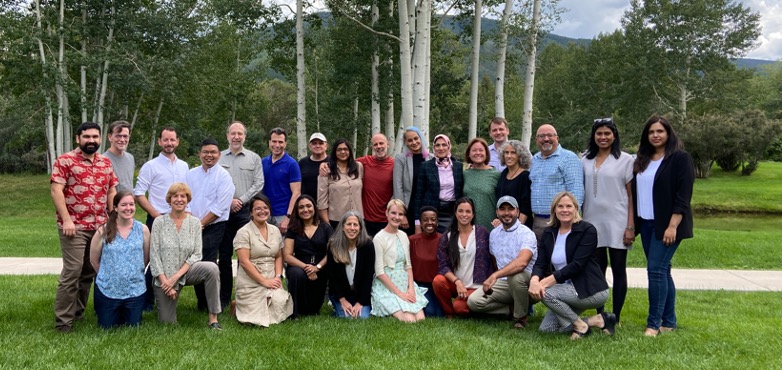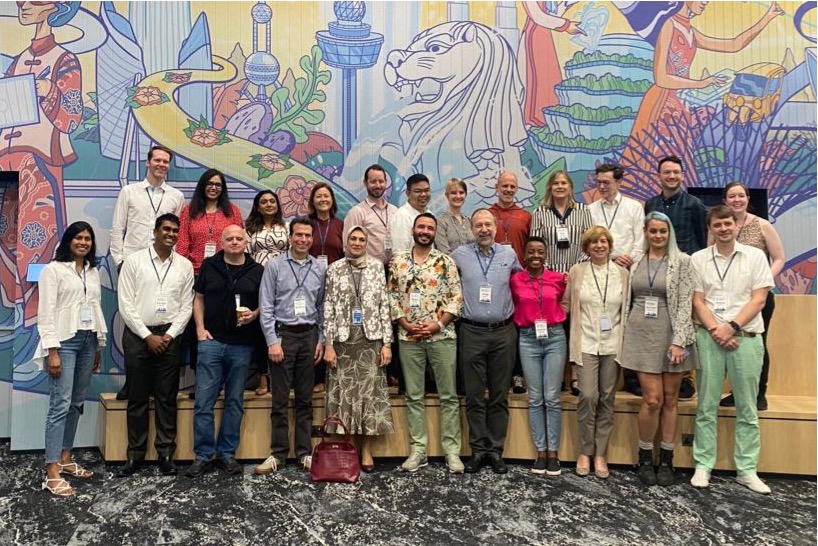In a rapidly changing world, anticipating future shifts and trends becomes crucial for informed decision-making. In collaboration with Autodesk, Aspen Digital assembled its first Foresight Group, comprising experts tasked with envisioning the world 20 years ahead. Among them is Professor Shereen Hussein, Founding Director of the MENARAH Network. Over the course of eight months, with several in-person and virtual meetings, this diverse group delved into major themes that will reshape our world, including demographic divides and life on a changing planet. In this blog, we explore the key insights from the Foresight Group and reflect on the implications of population ageing in the Middle East within this context.

Foresight is an established field of inquiry that employs critical analysis, structured prompts, and discussion to develop and explore possible future scenarios. By engaging in strategic foresight, policymakers and businesses can make informed decisions and navigate the uncertainties ahead. Aspen Digital employed similar strategies to explore possible, probable, and preferable future visions.

The Foresight Group delved into two major themes with significant challenges and opportunities: demographic divides and life on a changing planet.
Demographic Divides: The world is witnessing major demographic shifts, with populations in Europe, East Asia, and the Middle East growing older while younger populations are booming in other parts of the world, especially in the global south. These shifts present both challenges and opportunities for our interconnected world. Within the Middle East, population ageing carries implications for the region’s social, economic, and healthcare systems.
Life on a Changing Planet: From geopolitical conflicts to devastating weather events, our world faces evolving challenges that may disrupt people’s way of life. Adapting and thriving in this changing landscape require transforming societies and systems. Considering the implications of these changes in the Middle East is crucial for fostering resilience and mitigating risks associated with population ageing.

The Foresight Group engaged in extensive discussions and explored various possible futures. While not predictions, these scenarios shed light on potential trajectories and serve as valuable inputs for planning and decision-making. Let’s explore a selection of the eight possible futures identified by the Group:
✴︎ Eight future trends
1. Energy Production Shifts: As the world grapples with climate change, the transition away from fossil fuels gains momentum, with renewable energy sources becoming increasingly prevalent.
2. Digital Identities and Biometrics: Biometric identification will become more widespread, but it also creates new barriers for those for whom such systems don’t work reliably, potentially leading to an “invisible” undocumented population.
3. Private Actors vs States: The growing power of corporations blurs the lines between private actors and states, potentially resulting in competition and adversarial relationships.
4. AI and Information Interaction: Advances in AI enable new ways of interacting with information, potentially leading to greater understanding and connection with the natural environment.
5. Immigration Policies and Ageing Countries: Restrictive immigration policies may exclude immigrants, but ageing countries may need to attract immigrants to support their social and economic systems.
6. Crisis Fatigue and Disengagement: The constant influx of global news and crises may lead to crisis fatigue and disengagement from international coordination, potentially weakening multilateral institutions.
7. Prolonged Working Lives: People live and work longer, challenging traditional power structures and creating generational economic disconnects.
8. AI Tools and Conflict: AI tools, such as deep fakes and autonomous vehicles, may dehumanise conflict, leading to challenges in attributing violence and regulating emerging technologies.
How Can the MENA Region Prepare for Possible Futures?
The Foresight Group’s work yielded valuable insights into the potential future trajectories of our world. By exploring these scenarios, policymakers, businesses, and individuals can gain a deeper understanding of the challenges and opportunities that lie ahead. Foresight allows us to anticipate and prepare for potential disruptions, make informed decisions, and shape a more resilient future.
Population ageing poses unique implications for the Middle East within the context of demographic divides and life on a changing planet. As the region’s population continues to age, it will face challenges in healthcare, social systems, and economic productivity. The Foresight Group’s insights emphasise the importance of proactive planning and adaptation to address these challenges.
As the Middle East grapples with the implications of population ageing, it becomes crucial for countries and individuals in the region to proactively plan and adapt to the challenges and opportunities that lie ahead. The insights from Aspen Digital’s Foresight Group shed light on potential strategies that can help create inclusive and sustainable systems for an ageing population. Here are some key strategies to consider:
1. Strengthen Healthcare Systems:
Robust and well-equipped healthcare systems are essential for addressing the healthcare needs of an ageing population. Governments should prioritise investment in healthcare infrastructure, ensuring adequate facilities and long-term care services. Additionally, training healthcare professionals in geriatric medicine and promoting preventive healthcare measures can significantly improve the quality of life for older individuals.
2. Enhance Social Support Systems:
Social isolation is a significant concern among the elderly population. To address this, it’s important to establish strong social support systems. Governments and communities can work together to create social networks, community programs, and caregiver support systems. By promoting age-friendly environments, intergenerational activities, and inclusive communities, we can foster social connections and prevent social isolation among older adults.
3. Foster Economic Productivity:
As people live longer and healthier lives, there is a need to redefine traditional notions of retirement. Governments should develop policies encouraging active ageing and workforce participation among older adults. Providing training and re-skilling opportunities can enable older individuals to remain productive contributors to the economy. Additionally, incentivising flexible retirement options, entrepreneurship, and intergenerational collaboration can tap into the knowledge and experience of older workers, creating a more inclusive and dynamic workforce.
4. Embrace Technology and Innovation:
Technology plays a crucial role in addressing the challenges of an ageing population. Governments and organisations should invest in research and development for age-friendly technologies, assistive devices, smart homes, and digital healthcare solutions. These innovations can enhance the quality of life for older individuals, promote independence, and improve access to healthcare services. Ensuring digital inclusivity and providing training programs can bridge the technological divide and empower older adults to navigate the digital world effectively.
5. Formulate Comprehensive Policies:
To effectively address the implications of population ageing, it is essential to develop comprehensive policies encompassing healthcare, social support, economic strategies, and technological advancements. Governments should collaborate with academia, civil society, and experts to formulate national strategies for ageing populations. These policies should be dynamic, adaptable, and regularly evaluated to stay in sync with emerging trends and evolving needs. By fostering collaboration and knowledge-sharing, policymakers can make informed decisions that positively impact the lives of older individuals.
As we navigate future uncertainties, strategic foresight allows us to anticipate potential disruptions, make informed decisions, and shape a more resilient Middle East. By embracing these strategies, we can pave the way for a future that embraces the potential of an ageing population and ensures a thriving society for all.

The MENARAH Network continues to play a pivotal role in facilitating the response to population ageing and its intersections with other potential futures. From the rise of AI to climate change, migration dynamics, and the changing roles of private and state actors, the network provides a platform for dialogue and collaboration.
With its commitment to interdisciplinary approaches and evidence-based policymaking, MENARAH empowers the Middle East to navigate the challenges and embrace the opportunities of population aging.


Founder and Director
Shereen Husseinis a Health and Social Care Policy professor at the London School of Hygiene and Tropical Medicine (LSHTM), United Kingdom.
Shereen Founded the MENARAH Network in 2019, through an initial grant from the Global Challenge Research Fund, UKRI. She is a medical demographer with expertise in ageing, family dynamics, migration and long-term care systems. Shereen regularly collaborates with the United Nations, the World Health Organisation and the World Bank in policy and research focused on ageing in the Middle East and North Africa Region.
Shereen received her undergraduate degree in statistics and a postgraduate degree in computer science at Cairo University. She completed an MSc in medical demography at the London School of Hygiene and a PhD in quantitative demography and population studies at the London School of Economics and Political Science, United Kingdom.



